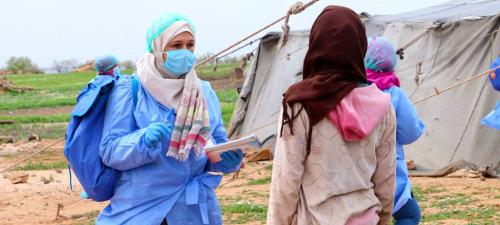Coronavirus pandemic threatens crises-ravaged communities, UN appeals for global support
A psychosocial counsellor in Jordan's Azraq refugee camp informed the UN Population Fund (UNFPA) on Thursday that during the first four days of the COVID-19 lockdown she called beneficiaries to let them know that “virtual support" was available.

Outreach workers in central-western Syria are raising awareness about the pandemic.
Orouba Amin has spent 11 years providing psychosocial care to survivors of trauma and violence, from refugees escaping the horrors of war to women and girls escaping sexual abuse and exploitation. Today, her work comes on top of a new threat: the coronavirus pandemic.
Around the world, as governments implement lockdowns and movement restrictions, women’s centres and safe spaces are closing their doors – even as evidence mounts that gender-based violence may be increasing.
Countries are also seeing their reproductive health services being curbed as resources are diverted to the pandemic response. Where reproductive health care remains available, movement restrictions and fears of the virus are keeping women from seeking attention.
And communities affected by humanitarian crises are particularly imperiled by these conditions. Many are already struggling with poverty and limited access to health services. Infection-control measures are even harder to implement in densely packed settlements with limited water and sanitation resources.
These challenges are greatly exacerbated for women who are pregnant, require family planning supplies or need protection from violence.
Nowhere to hide
In Jordan, where nearly 400 cases of COVID-19 have been confirmed, a curfew has been imposed to slow transmission of the virus. This has added hardship in Azraq Camp, where an average of seven people are crowded into each prefabricated shelter.
She painted a picture of shop owners struggling to import essential food items, scant livelihood options and families facing difficult choices as they try to put food on their tables.
And as social life increasingly takes place online, so does sexual harassment, one woman told UNFPA.
The camp’s safe spaces for women and girls, run by the International Rescue Committee with support from UNFPA, have been closed.
As Ms. Amin and her colleagues race to find new means of providing services to women and girls in need, she is offering counselling via telephone – but many lack the privacy needed to speak on the phone about sensitive issues while others simly do not have their own phones.
Ms. Amin also provides assistance via text message and WhatsApp.
“One of the women texted me on the dedicated WhatsApp number, and when I responded to her, she said, ‘I’m fine now, as I know that you are there for me in case I need you.’ This meant everything to me,” she said.
Resources vital
In humanitarian situations, women’s vulnerability to violence and exploitation escalates. And even before the pandemic, hundreds of women and girls in humanitarian and fragile settings died each day from complications of pregnancy and childbirth. Now, as health systems and protection services are stressed by the pandemic, conditions for women are poised to worsen.
UNFPA has urgently called for funding to the COVID-19 Global Humanitarian Response Plan, with a requirement of $120 million for UNFPA to ensure the health and safety of women and girls affected by humanitarian crises. In addition, UNFPA has appealed for $67.5 million to support COVID-19 preparedness efforts through March and April.
This amount – a total of $187.5 million – will go, among other things, towards strengthening health systems and ensuring continuity of services for survivors of gender-based violence. It is separate from the humanitarian funding needed for UNFPA’s ongoing support to crisis-affected countries.
For both UNFPA’s humanitarian appeal and its COVID-19 response plan, flexible funds are needed to ensure an agile response as conditions on the ground evolve.
UNFPA is already ramping up efforts to address the pandemic in humanitarian settings, including in central-western Syria. Also under curfew, outreach workers are raising awareness of the pandemic, infection-control measures and women’s rights.
It is an uphill battle, said Ghadeer Mohammed Ibrahim Qara Bulad, director of the Women’s Development Project at the Islamic Charitable Association in Homs. “The majority of the families we visit are awfully poor and cannot even buy sterilizers,” she said.
She has also seen widespread gender-based violence and fears it will only intensify.
“During my visits, I saw a woman being beaten by her husband during the curfew,” said Ms. Bulad. “I think the percentage of gender-based violence will increase and increase dramatically”.
Source:UN
- 244 reads
Human Rights
Ringing FOWPAL’s Peace Bell for the World:Nobel Peace Prize Laureates’ Visions and Actions

Protecting the World’s Cultural Diversity for a Sustainable Future

The Peace Bell Resonates at the 27th Eurasian Economic Summit

Declaration of World Day of the Power of Hope Endorsed by People in 158 Nations

Puppet Show I International Friendship Day 2020

